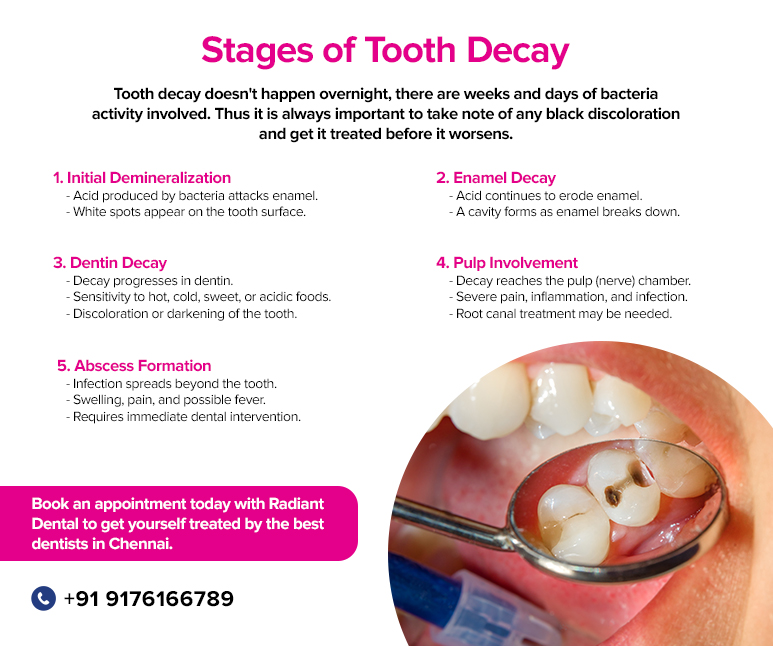Dental Filling – Process, Cost and Causes
Smiles and hearty laughs are the universal language of kindness and love,” they say. But what happens when you have tooth decay leaving behind its unsightly mark on your once-beautiful smiles?
Tooth decay is one of the most common issues in kids and adults as regardless of age, cavity affects every tooth. However, there is a myth surrounding cavities in milk teeth that they will fall off thus, they don’t need to be treated. But, it isn’t true.
A cavity, no matter how small or large, should be treated in time to ensure that it doesn’t spread. If the primary or the milk teeth have cavities, there are chances that permanent teeth will be affected as well. Thus, consulting a dental clinic in Chennai is important even in the early stages of life.
But, do you really know the causes of tooth cavities?
What Causes Decays and Cavities?
There are multiple causes of dental cavities including what we eat, how we take care of our teeth, and our systematic conditions.
Diet: Consuming a diet high in sugars, carbohydrates, and acidic foods and beverages is the primary cause of bacteria in your mouth. Sugars provide a ready source of energy for the bacteria to produce acid which decays the teeth. Frequent snacking and sipping sugary drinks throughout the day can expose your teeth to prolonged periods of acid attack, increasing the risk of decay.
Poor Oral Hygiene: Inadequate brushing and flossing allow food particles to accumulate on the teeth, forming a sticky film called plaque. Plaque provides a protective environment for bacteria to thrive and produce acid. If plaque is not removed through proper oral hygiene, it can harden into tartar, which can contribute to decay.
Saliva: Saliva plays a crucial role in maintaining oral health. It helps neutralize acids, remineralize teeth, and wash away food particles and bacteria. Conditions that reduce saliva flow, such as certain medications or medical conditions, can increase the risk of cavities.
Genetics: Some individuals may be more prone to cavities due to genetic factors that influence the composition of their saliva, the strength of their enamel, and their susceptibility to bacterial attacks.
Fluoride: Fluoride is a mineral that helps strengthen enamel and makes it more resistant to acid attacks. Fluoride is present in many toothpaste and mouthwash products, and it can also be found in tap water in some areas. Using fluoride-containing products and drinking fluoridated water can help protect against cavities.
Lack of Regular Dental Visits: Regular dental check-ups are essential for detecting and addressing early signs of decay. Dentists can perform cleanings, provide fluoride treatments, and offer guidance on proper oral hygiene practices.
Stages of Tooth Decay

Tooth decay doesn’t happen overnight, there are weeks and days of bacteria activity involved. Thus it is always important to take note of any black discoloration and get it treated before it worsens.
- Initial Demineralization
– Acid produced by bacteria attacks enamel.
– White spots appear on the tooth surface.
- Enamel Decay
– Acid continues to erode enamel.
– A cavity forms as enamel breaks down.
- Dentin Decay
– Decay progresses in dentin.
– Sensitivity to hot, cold, sweet, or acidic foods.
– Discoloration or darkening of the tooth.
- Pulp Involvement
– Decay reaches the pulp (nerve) chamber.
– Severe pain, inflammation, and infection.
– Root canal treatment may be needed.
- Abscess Formation
– Infection spreads beyond the tooth.
– Swelling, pain, and possible fever.
– Requires immediate dental intervention.
Book an appointment today with Radiant Dental to get yourself treated by the best dentists in Chennai.
The Process of Dental Filling: What to Expect?
If you have a dental cavity, your dentist will likely recommend a dental filling. The dental filling cost can vary depending on a variety of factors, which we’ll discuss further in the blog. But first, let’s understand the process of dental filling.
Step 1: Anesthesia
The process begins with the dentist administering local anesthesia to numb the area around the affected tooth, ensuring a painless procedure.
Step 2: Tooth Preparation
The decayed or damaged part of the tooth is carefully removed using dental instruments, leaving a clean and healthy tooth structure for the filling.
Step 3: Filling Material Selection
Depending on the specific case, the dentist selects the appropriate filling material, such as amalgam, composite resin, glass ionomer, or ceramic.
Step 4: Placing the Filling
The chosen filling material is placed into the prepared cavity. The dentist ensures it is correctly shaped and contoured to match the natural tooth anatomy.
Step 5: Bite Adjustment
The dentist checks the patient’s bite and makes any necessary adjustments to ensure a comfortable and proper occlusion.
Step 6: Polishing
The filled tooth is polished to smoothen the surface, making it blend seamlessly with the surrounding teeth.
Step 7: Aftercare Instructions
The patient receives post-procedure instructions, including proper oral hygiene, diet, and possible temporary sensitivity.
Step 9: Regular Checkups
Routine dental checkups are essential to monitor the filling’s condition and maintain oral health.
Composite Dental Fillings: Aesthetic, Tooth Colored Restoration
Composite filling is made from a tooth-colored resin material. This makes them a popular choice for those who want their fillings to look natural. Unlike silver filling, composite fillings are aesthetic and are often used for front teeth.
Composite fillings are also quite durable, making them suitable for small to medium-sized cavities.
One of the advantages of composite fillings is that they can be bonded to the tooth, which can help to strengthen the tooth structure. However, composite fillings can be more time-consuming to place than other types of fillings, as they require the tooth to be kept clean and dry during the procedure.
The composite dental filling cost can vary depending on a number of factors, including the size and location of the cavity and the dentist’s experience and location. However, composite fillings are typically more expensive than amalgam (silver) fillings but less expensive than gold fillings.
Factors Affecting Dental Filling Cost
The dental filling cost can be influenced by a variety of factors. One of the primary factors is the type of filling material used. Composite fillings are typically more expensive than amalgam fillings but less expensive than gold fillings.
The size and location of the cavity can also affect the cost of the filling. Larger or more complex cavities typically require more time and material to fill, which can increase the cost. The location of the cavity can also influence the cost, as cavities in the back teeth can be more challenging to fill than those in the front teeth.
Other factors that can influence the dental filling cost include the dentist’s experience and location. Dentists with more experience or those located in urban areas may charge higher prices. The dental filling cost in India, and specifically, the cost of filling a tooth cavity in India, can vary significantly depending on these factors.
Importance of Regular Dental Check-ups
Regular dental check-ups are crucial for maintaining good oral health and preventing dental issues such as cavities. During a check-up, your dentist can clean your teeth to remove plaque and tartar, which can help to prevent cavities. They can also examine your teeth and gums for signs of any issues and provide treatment as necessary.
Regular check-ups from the best dental clinic in Chennai can also help to identify issues early before they become more serious.
In addition to helping to prevent and detect dental issues, regular check-ups can also provide an opportunity for you to discuss any concerns or questions you may have with your dentist. For instance, if you’re concerned about the dental filling cost, your dentist can discuss your options with you and help you to understand what to expect.
Choosing the Best Dental Clinic in Chennai for your Dental Fillings
If you’re in Chennai and in need of dental filling, it’s important to choose a reputable dental clinic. Radiant Dental Clinic in Chennai has experienced dentists who can provide high-quality care and treatment. We have up-to-date equipment and facilities to ensure that you receive the best possible care. Along with a team of 60+ dentists and having 9 clinics across Chennai, we ensure the best possible care for you. Book an appointment today to know more about our services.

 +91 9513446186
+91 9513446186
